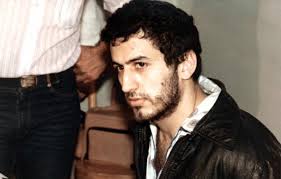
Although Lebanon’s President-elect Bashir Gemayel was assassinated on September 14, 1982 — along with 26 others who perished when a bomb exploded in the Phalange Party headquarters in Ashrafieh — the country’s Judicial Council finally launched a trial in absentia, calling on Habib Shartouni, who confessed to planting the bomb before escaping from prison, to turn himself in.
Jean Fahd, the magistrate entrusted with the case, issued a statement that gave Shartouni an ultimatum to hand himself over to the judiciary “within 24 hours at the latest from the March 3, 2017 trial session”, though it is unclear what meaning that ultimatum has.
Fahd further demanded proof that Nabeel Al Alam, a second culprit involved in the plot, is dead.
Shartouni, a member of the Syrian Social National Party (SSNP), was born into a Maronite Catholic family in Aley (Chouf Mountains) and served in one of the SSNP stations there though he fled to Cyprus and France at the beginning of the civil war where he attended university and obtained a business degree. During a 1977 visit to Lebanon, he formally joined the SSNP and became an active member though it was unclear whether Syrian intelligence operatives recruited him in France. It was in Paris that he met Nabeel Al Alam, then a leading SSNP intelligence lieutenant, who made a big impression on him.
Al Alam knew that Shartouni’s family members lived in the same building where the Phalange Party kept a headquarters, which most probably justified the recruitment. Two days after the assassination, the 24-years-old Shartouni was arrested by the Lebanese Forces and handed over to the Lebanese judiciary. In his confession, he called Bashir a traitor and accused him of selling the country to Israel, and acknowledged that he “was given the explosives and the fancy long-range electronic detonator by Al Alam, who promptly fled to Syria and vanished.
The assassin spent eight years at the Roumieh prison without a trial, but escaped on October 13, 1990 under mysterious circumstances, during the final Syrian offensive in Lebanon that crippled the Michel Aoun government and forced the latter into exile. Lebanese authorities believed the assassin received assistance from the Syrians and moved to Damascus where he may still be.
The latest trial, even if it is in absentia, relating to the assassination of an elected head of state at the height of a civil war that saw the country simultaneously occupied by both Israel and Syria, is intended to deliver justice. His widow, Solange Gemayel, spoke outside the Higher Judicial Council building on Friday, where she declared: “I waited 34 years to witness the trial of Bashir’s killers,” while their son, Nadim Gemayel, added his own perspective. “It is time to try all criminals, including Shartouni,” said the Beirut parliamentarian, pleading with authorities that they should no longer “delay the overdue trial”.
One of the country’s leading statesmen, Edmond Rizk, summarised the latest legal initiative when he said: “We want the judiciary to fully carry out its role and remind everyone that this trial is not intended to avenge anyone, but to restore the state’s authority beginning with its judiciary.”
GN
Leave a Reply
You must be logged in to post a comment.